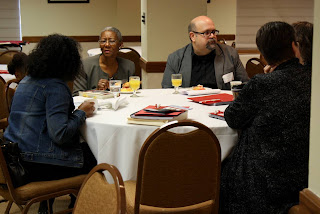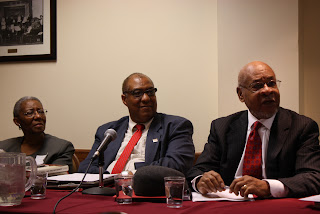Saturday, June 15, 2013
Saturday, February 9, 2013
Conference 2013 Call for Papers
THE NORMAN CHAPTER OF THE
OKLAHOMA EDUCATIONAL STUDIES ASSOCIATION
Call for Proposals for
the 2013 Annual Meeting, August 9-10
The
University of Oklahoma
GENERAL CALL - Click here for pdf
OESA-Norman brings together faculty, graduate students, independent
scholars and teacher-researchers interested in exploring fundamental, critical
problems and questions associated with education, both within and beyond traditional
notions of schooling. This conference is
an excellent opportunity for graduate students to present their work in a
supportive and collegial environment. Faculty
members are also encouraged to attend, to present individually or with
students, and to serve as discussants and moderators. Activists, practitioners, and members of the
community outside academe are also invited to attend, at a reduced registration
fee.
We are especially honored to announce
that our keynote speaker will be past President of AESA (2006), Professor
Steven Tozer, philosopher of education from the University of Illinois,
Chicago. Dr. Tozer who is lead author of
the most widely taught educational foundations textbook, School and Society: Historical
and Contemporary Perspectives (McGraw-Hill, 2008), was also lead editor of Handbook of Research in the Social
Foundations of Education (Routledge, 2011). In keeping with our
theme for 2013, Dr. Tozer has a great deal to share about funding and
developing innovative leadership and mentorship programs that actually take
local and practitioner wisdom seriously toward the end of re-imagining,
reforming, and rebuilding neighborhood schools in Chicago’s West Side.
The 2013 program committee invites proposals
for papers, symposia, and alternative sessions—presenting inquiries on all
topics related to the broad field of educational studies as conceived by OESA’s
national affiliate, the American Educational Studies Association (http://www.educationalstudies.org/). We welcome proposals from a full range of
theoretical, disciplinary, and interdisciplinary perspectives that include the
following educational emphases:
·
History, Philosophy, Sociology, Anthropology, Economics, and
Aesthetics of Education
·
Educational Policy Studies
·
Curriculum Studies
·
Cultural Studies
·
Gender and Sexuality Studies
·
Comparative and International Education
·
Social-Psychological Theory
·
Rhetoric and Literacy-Educational Studies
·
Family Studies
·
Professional Education Studies
·
Library, Mass Communications, and Media-Literacy
Education
·
Museum and Arts-Integrated Education
·
Restorative Justice and Prison Education
·
School Social Work & Youth
Recreational Education
·
Education for Social Justice and
Eco-Justice
We especially encourage proposals that collaborate
across academic and other educational institutions; consider inter-and
cross-disciplinary topics, and address the conference theme.
THEME FOR 2013
Educating
Activism: Re-Imagining the Future of Leadership and Stewardship in the
Professoriate.
SUBMISSION
ABOUT OESA-Norman (Mission Statement)
OESA-Norman is an academic organization that
takes as its primary mission to support education, and professional development
of prospective, past, and current graduate students doing work in the field of
Educational Studies (http://csfeonline.org/).
It will do this by providing opportunities for academic and professional
development.
CALL FOR PROPOSALS
Proposal
Overview
In March of last year, OESA-Norman held our
10th anniversary celebration and invited a panel representing university
leadership from administration, policy, practice, and research to discuss “the
future of the professoriate.” The event
was well-received, but time constraints kept us from engaging some of the most
pressing questions regarding the historical and contemporary role of the
American Association of University Professors (AAUP), the status of shared
governance in higher education, the meaning of leadership, and the future of
academic freedom. We
wish to continue that conversation and expand it to include questions
concerning the educational implications of activism and outreach programs that
connect higher education to schools and to the larger community. To that end, this year’s theme focuses on specifically
educational inquiry into how we become leaders in and custodians of our
communities, our classrooms, and our field.
Proposal Guidelines Proposal
Criteria and Length
Proposal submissions should provide a brief
summary of the paper, symposium, or alternative session. Your summary should include: objectives/purposes, context, methods, arguments/conclusions,
and, importance/relevance. Proposal submissions are
blind reviewed and thus should be submitted without any references to identify
the authors. Proposals for individual papers should not exceed 500 words and those
for symposia and alternative sessions should not exceed 1000 words (excluding
references).
Information to Include
Include the title of the paper, symposium
(and individual papers), or alternative session, as well as the name,
institutional affiliation, email address, and telephone number of each participant.
(The body of the proposal, however, should not include any identifying
information.)
Review Process
Multiple reviewers will evaluate all proposals
without access to identifying information about the author(s). Based on the evaluations and recommendations
of the program and academic committee, the OSEA secretary will notify the
person submitting the proposal as to whether the proposal has been
accepted. In the case of co-authored
papers, symposia, or alternative sessions, the OESA secretary will notify the
person who submitted the proposal and that person will notify the other
participants regarding acceptance of the proposal.
Proposal Categories
Individual
Paper
Once accepted, individual papers will be
grouped together around common or overlapping themes, in the form of a
symposium, with an assigned chair and/or discussant. Presenters will have approximately 20 minutes
to read, summarize, or discuss their individual papers.
Symposium
A symposium is composed of three to five
participants (who present or summarize and discuss papers), as well as a chair
and a discussant. Each symposium is
organized around a common theme. A symposium proposal should include the title
of the symposium, a brief (one- or two-paragraph) overview of the symposium
theme, and the title and brief description of each paper. Symposia will be allocated 90 minutes on the
program.
Alternative
Format
Formats for alternative sessions include:
performances; video and multimedia presentations; and round-table
dialogues. Proposals for alternative
sessions should include information on the session’s topic, content, approach
or purpose, as well as the roles to be played by the participants. Typically, alternative sessions will have 90
minutes to present or discuss their topic.
Monday, March 26, 2012
OESA Hosts Future of the Professoriate Panel
OESA Hosts Future of the Professoriate Panel
FOR IMMEDIATE RELEASE
March 13, 2012
TO: Andy Rieger, The Norman Transcript
FROM: The Norman Chapter of the Oklahoma Educational Studies Association (OESA - Norman)
RE: Public Forum – Future of the Professoriate Panel
CONTACT: Johnnie-Margaret McConnell, OESA Publications Chair
The University of Oklahoma’s graduate student organization the Norman Chapter of Oklahoma Educational Studies Association (OESA - Norman) hosts a public panel featuring “The Future of the Professoriate” on Friday, March 30, 2012, from 4:30-6:00 pm, within the Oklahoma Memorial Union’s Regents Room. The Oklahoma Memorial Union is located at 900 Asp Ave., in Norman, Oklahoma. OESA is the graduate student organization for the Educational Studies program within OU’s Jeannine Rainbolt College of Education.
Participants on the panel include: Dr. Nancy Mergler (Senior Vice President and Provost, University of Oklahoma), Dr. Lisa Holder (Director of Teacher Education, Oklahoma State Regents), Dr. Penny Pasque (Assistant Professor of Educational Leadership and Policy Studies, University of Oklahoma), and Dr. Terry Spigner (Professor of Advanced Professional and Special Services, University of Central Oklahoma). Panelists are invited to present their unique experiences in the areas of administration, policy, research and practice as it relates to the professoriate. Panel members will field questions from education scholars and practitioners, and answer public inquiries.
The Norman Chapter of the Oklahoma Educational Studies Association is committed to providing a space for the free and open exchange of ideas concerning education. “It is our sincere hope that this panel discussion will enable those who are considering future careers as professors, the chance to learn more about the potential opportunities and challenges that might affect their role in higher education.” —Goldie Thompson, President OESA- Norman.
OESA – Norman hopes that providing a public forum featuring the aforementioned panelists will create a framework for graduate students to consider the potential impact of administrative and policy issues on their future professorial practice. “This forum will be a great opportunity for graduate scholars to inquire about current employee evaluation assessments, professorial responsibilities, as well as accountability measures. Additionally, scholars might ask questions about current legislative concerns that could potentially affect the professoriate.” – Goldie Thompson, President OESA-Norman.
OESA-Norman is an academic organization that takes as its primary mission the support, education, and professional development of prospective, past, and current graduate students doing work in the field of Educational Studies. This is done by providing opportunities for academic and professional development. For more information on OESA, please visit our website at http://www.ou.edu/oesa.
Friday, March 18, 2011
"Bullied" Screening and Panel Discussion: March 29 & 31
We are thrilled to announce that the Xenia Institute and the Norman Public Schools in cooperation with the Norman Human Rights Commission are hosting a film screening of "Bullied" followed by a discussion panel on Tuesday, March 29 and Thursday, March 31. If you were unable to attend the OESA- Norman screening of “Bullied” and panel discussion March 5, we encourage you to attend the screening on March 29 or 31.
The following is quoted from the City of Norman Community Activities webpage:
The film will be shown at the Mary Eddy and Fred Jones Auditorium, located in the University of Oklahoma’s Fred Jones, Jr. Museum of Art, 555 Elm Avenue, at 6:30 p.m. on Tuesday, March 29, and at the Nancy O’Brian Center for the Performing Arts, 1809 Stubbeman, on Thursday, March 31, also at
6:30 p.m. The showing is free to the public and no reservations are required, although seating at the Eddy and Jones Auditorium is limited to 146 seats. Both facilities are accessible and have spaces available for wheelchairs.
“This is an excellent opportunity to continue the community dialogue about bullying, and communities’ responses to that issue” said Clint Williams, Executive Director of the Xenia Institute and member of the Norman Human Rights Commission.
For additional information about attending the screening of “Bullied” call (405) 366-5404
Saturday, March 12, 2011
Conference 2011 "New Frontiers" Pictures
Thank you to all participants and supporters who made this year's conference such an enlightening and meaningful experience!
Subscribe to:
Comments (Atom)















































































































































